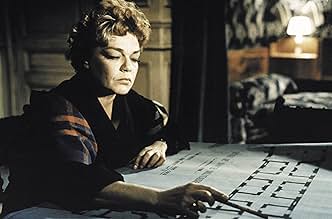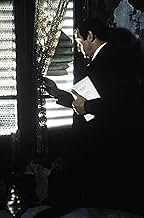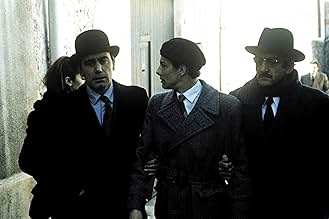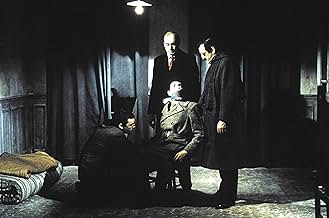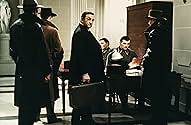AVALIAÇÃO DA IMDb
8,1/10
28 mil
SUA AVALIAÇÃO
Um relato sobre combatentes clandestinos da resistência na França ocupada pelos nazistas.Um relato sobre combatentes clandestinos da resistência na França ocupada pelos nazistas.Um relato sobre combatentes clandestinos da resistência na França ocupada pelos nazistas.
- Direção
- Roteiristas
- Artistas
- Prêmios
- 4 vitórias e 1 indicação no total
- Direção
- Roteiristas
- Elenco e equipe completos
- Produção, bilheteria e muito mais no IMDbPro
Avaliações em destaque
This is probably one of the best fiction movies ever made on the French resistance during Worl War II. Far from the usual romantic cliches showing handsome young men playing tricks with the Nazis and falling in love with sublime women, the substance of the movie is reality. It depicts a "shadow army" made of courageous men who are ready to sacrifice their lives but are aware of the huge cost they will eventually have to pay. It shows the cruel and sometimes inhuman choices they have to make in order to survive. This is a very useful movie that gives a real hint of what resistance truly was.
ARMY IN THE SHADOWS (Jean-Pierre Melville - France/Italy 1969).
Jean-Pierre Melville's work features basically two themes: the world of crime and the French resistance. In Melville's eyes, these two worlds are very much the same. The gangster codes he adopted for many of his films were based largely on the codes of the French resistance and his own experiences during the German occupation (not the other way round as some people suggested).
Melville must be the most celebrated French director at this point in the U.S, after the re-release of "Army in the Shadows" in 2006, that was almost universally applauded by the critics as a work of genius or a forgotten masterpiece. Now, in many ways this is a good film, but something is missing, and I can't really put my finger on it. Perhaps it's the clinically almost surreal interaction between the characters, that worked so well in Melvile's gangsters film, but here he is depicting (admittedly his own ) reality and very much his personal take on French resistance, where "real life" plays a much greater part than in the surreal settings of many of his gangster films, but it doesn't feel that way when watching this. The film is languidly paced with a slow build-up, but never really catches fire. With Melville's characteristically cold - almost clinical - direction, it's partly captivating in parts, but perhaps the tone is a little too detached for my taste. He certainly takes his time to tell the story, but the acting is first class with Lino Ventura and Simone Signouret giving memorable performances among a first-rate cast.
Camera Obscura --- 7/10
Jean-Pierre Melville's work features basically two themes: the world of crime and the French resistance. In Melville's eyes, these two worlds are very much the same. The gangster codes he adopted for many of his films were based largely on the codes of the French resistance and his own experiences during the German occupation (not the other way round as some people suggested).
Melville must be the most celebrated French director at this point in the U.S, after the re-release of "Army in the Shadows" in 2006, that was almost universally applauded by the critics as a work of genius or a forgotten masterpiece. Now, in many ways this is a good film, but something is missing, and I can't really put my finger on it. Perhaps it's the clinically almost surreal interaction between the characters, that worked so well in Melvile's gangsters film, but here he is depicting (admittedly his own ) reality and very much his personal take on French resistance, where "real life" plays a much greater part than in the surreal settings of many of his gangster films, but it doesn't feel that way when watching this. The film is languidly paced with a slow build-up, but never really catches fire. With Melville's characteristically cold - almost clinical - direction, it's partly captivating in parts, but perhaps the tone is a little too detached for my taste. He certainly takes his time to tell the story, but the acting is first class with Lino Ventura and Simone Signouret giving memorable performances among a first-rate cast.
Camera Obscura --- 7/10
If you have any interest whatsoever in French cinema, World War II, moral ambiguity, or Simone Signoret, see this film.
Filmed in a cold, documentary-like style, the "Shadow Army" tells the intertwining stories of several members of the French resistance. The movie defies any sort of simple categorization. It is a thriller without being thrilling. It is a spy story without a single gadget. It portrays the tedium of the task without being boring. Finally, it tells a story of heroic courage without the benefit of a single hero. That last point isn't immediately evident and you are free to disagree, of course, but heroes (as defined in the usual movie terms) are hard to come by in this story.
A popular adage goes; one person's terrorist is another person's freedom fighter. This movie serves up proof to that lie. There are true freedom fighters that will never be labeled "terrorist" and you will meet them during the course of this film. The movie makes clear that they, and the ones around them, paid a high price in pursuit of freedom. Not just in life and limb, but in moral conviction. As the movie unfolds, I found myself asking, is this action justified? The answer, of course, is that it most certainly is. The better question is would I, or anyone I know, have the courage to do what had to be done.
The technical aspects of the film are all first rate even though a bit below the best of European cinema at the time. (In some ways, the lack of high definition color and sets give it a feel much more in keeping with the time it portrays.) The actors disappear into their roles and there is not a star-turn to be found.
According to the announcement made before the screening I attended, it is being released in the United States on May 12, 2006, just before the summer blockbuster crush. Why that date and why now, almost 30 years after it was made, I do not know. My guess is it probably has something to do with money. (Doesn't it always?) Whatever the reasons, skip the Tom Cruise vehicle and don't miss the opportunity to see it.
Filmed in a cold, documentary-like style, the "Shadow Army" tells the intertwining stories of several members of the French resistance. The movie defies any sort of simple categorization. It is a thriller without being thrilling. It is a spy story without a single gadget. It portrays the tedium of the task without being boring. Finally, it tells a story of heroic courage without the benefit of a single hero. That last point isn't immediately evident and you are free to disagree, of course, but heroes (as defined in the usual movie terms) are hard to come by in this story.
A popular adage goes; one person's terrorist is another person's freedom fighter. This movie serves up proof to that lie. There are true freedom fighters that will never be labeled "terrorist" and you will meet them during the course of this film. The movie makes clear that they, and the ones around them, paid a high price in pursuit of freedom. Not just in life and limb, but in moral conviction. As the movie unfolds, I found myself asking, is this action justified? The answer, of course, is that it most certainly is. The better question is would I, or anyone I know, have the courage to do what had to be done.
The technical aspects of the film are all first rate even though a bit below the best of European cinema at the time. (In some ways, the lack of high definition color and sets give it a feel much more in keeping with the time it portrays.) The actors disappear into their roles and there is not a star-turn to be found.
According to the announcement made before the screening I attended, it is being released in the United States on May 12, 2006, just before the summer blockbuster crush. Why that date and why now, almost 30 years after it was made, I do not know. My guess is it probably has something to do with money. (Doesn't it always?) Whatever the reasons, skip the Tom Cruise vehicle and don't miss the opportunity to see it.
Based on truth, the Army in the Shadows takes the French men and women of the Resistance as its theme, at a point near the end of the war when the Resistance movement and Nazi intelligence about its work and staff are both firmly established. As well as giving a thrilling history lesson in the workings of the Resistance, from the rural ladies who operated safe houses, to the chateaux-dwelling aristocrats whose lawns played host to light aircraft smuggling collaborators in and out of France, it also is a fascinating essay on the gruesome realities of heroism: including moments of hopelessness and complete failure of nerve. Events test our group of collaborators, so that each one bumps up against his or her personal limit, as to what they are intelligent enough to understand, brave enough to endure, and determined enough to achieve. Excellently acted and directed, it is a classic uncompromising Melville thriller.
"L'Armée des ombres" (1969) was shown in the U.S as "Army of Shadows." The film is co-written and directed by Jean-Pierre Melville.
The time is 1942 and the setting is France. Lino Ventura plays Philippe Gerbier, a high-ranking officer in the French resistance. Gerbier is intelligent, resourceful, and brave. He and his small band of urban fighters are constantly in danger of capture and torture by the Nazis. This isn't a film of rural partisans--it's a film where people meet in cafés and offices. No one knows when Nazi soldiers or Gestapo will sweep down and drag them off. No meeting is safe, and no relationship is safe either--how many people can remain silent under savage tortures that go on for days?
Although Ventura is excellent in the role, the movie is dominated by Simone Signoret as Mathilde--tougher and braver than any of the men, but possessing one terrible weakness.
This movie is different than most films about the French Resistance. Things don't go smoothly, they don't go well, fear is everywhere, and heroism often takes place in a prison cell where no one ever learns of it. It's fascinating, but grim.
"Army of Shadows" is a neglected film by a great director. It's definitely worth seeking out.
The time is 1942 and the setting is France. Lino Ventura plays Philippe Gerbier, a high-ranking officer in the French resistance. Gerbier is intelligent, resourceful, and brave. He and his small band of urban fighters are constantly in danger of capture and torture by the Nazis. This isn't a film of rural partisans--it's a film where people meet in cafés and offices. No one knows when Nazi soldiers or Gestapo will sweep down and drag them off. No meeting is safe, and no relationship is safe either--how many people can remain silent under savage tortures that go on for days?
Although Ventura is excellent in the role, the movie is dominated by Simone Signoret as Mathilde--tougher and braver than any of the men, but possessing one terrible weakness.
This movie is different than most films about the French Resistance. Things don't go smoothly, they don't go well, fear is everywhere, and heroism often takes place in a prison cell where no one ever learns of it. It's fascinating, but grim.
"Army of Shadows" is a neglected film by a great director. It's definitely worth seeking out.
Você sabia?
- CuriosidadesCinematographer Pierre Lhomme claimed that the last surviving, watchable print of the movie had turned completely pink with age. He later supervised the 2k resolution, digital restoration of the film at the Eclair Laboratories in Paris.
- Erros de gravaçãoIn the London WWII sequence, double yellow lines are visible on the road. These were only introduced in the UK in 1956 and didn't become common until the 1960s; a few of the street signs have a style not known before the 1960s.
- Citações
Philippe Gerbier: See you, Comrade.
Legrain: You a communist?
Philippe Gerbier: No. But I do have comrades.
- ConexõesFeatured in Mémoires pour Simone (1986)
Principais escolhas
Faça login para avaliar e ver a lista de recomendações personalizadas
Detalhes
- Data de lançamento
- Países de origem
- Idiomas
- Também conhecido como
- El ejército de las sombras
- Locações de filme
- Bunker de l'armée, Saint-Cyr-l'Ecole, Yvelines, França(execution by the Gestapo)
- Empresas de produção
- Consulte mais créditos da empresa na IMDbPro
Bilheteria
- Faturamento bruto nos EUA e Canadá
- US$ 861.983
- Fim de semana de estreia nos EUA e Canadá
- US$ 12.620
- 30 de abr. de 2006
- Faturamento bruto mundial
- US$ 931.732
Contribua para esta página
Sugerir uma alteração ou adicionar conteúdo ausente





